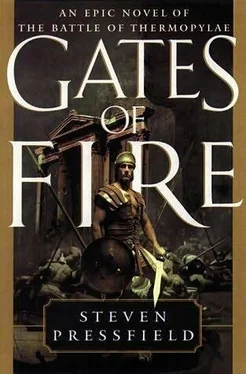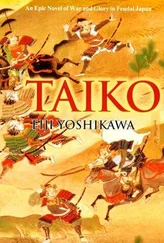Steven Pressfield - Gates of Fire - An Epic Novel of the Battle of Thermopylae
Здесь есть возможность читать онлайн «Steven Pressfield - Gates of Fire - An Epic Novel of the Battle of Thermopylae» весь текст электронной книги совершенно бесплатно (целиком полную версию без сокращений). В некоторых случаях можно слушать аудио, скачать через торрент в формате fb2 и присутствует краткое содержание. Жанр: Историческая проза, на английском языке. Описание произведения, (предисловие) а так же отзывы посетителей доступны на портале библиотеки ЛибКат.
- Название:Gates of Fire: An Epic Novel of the Battle of Thermopylae
- Автор:
- Жанр:
- Год:неизвестен
- ISBN:нет данных
- Рейтинг книги:3 / 5. Голосов: 1
-
Избранное:Добавить в избранное
- Отзывы:
-
Ваша оценка:
- 60
- 1
- 2
- 3
- 4
- 5
Gates of Fire: An Epic Novel of the Battle of Thermopylae: краткое содержание, описание и аннотация
Предлагаем к чтению аннотацию, описание, краткое содержание или предисловие (зависит от того, что написал сам автор книги «Gates of Fire: An Epic Novel of the Battle of Thermopylae»). Если вы не нашли необходимую информацию о книге — напишите в комментариях, мы постараемся отыскать её.
Gates of Fire: An Epic Novel of the Battle of Thermopylae — читать онлайн бесплатно полную книгу (весь текст) целиком
Ниже представлен текст книги, разбитый по страницам. Система сохранения места последней прочитанной страницы, позволяет с удобством читать онлайн бесплатно книгу «Gates of Fire: An Epic Novel of the Battle of Thermopylae», без необходимости каждый раз заново искать на чём Вы остановились. Поставьте закладку, и сможете в любой момент перейти на страницу, на которой закончили чтение.
Интервал:
Закладка:
I tried to make the platoon take water, I and my helot mate Dekton, whom they later called Rooster. We snuck a skin to them around the middle of the first watch, but the boys refused to accept it. At dawn they carried Mountain in on their shoulders, the way the fallen in battle are borne.
Alexandras' nose never did heal properly. His father had it broken again, twice, and reset by the finest battle surgeons, but the seam where the cartilage meets the bone never mended quite right.
The airway would constrict involuntarily, triggering those spasms of the lungs called by the Greeks asthma, which were excruciating simply to watch and must have been unbearable to endure. Alexandras blamed himself for the death of the boy called Mountain. These fits, he was certain, were the retribution of heaven for his lapse of concentration and unwarrior-like conduct.
The spasms enfeebled Alexandras' endurance and made him less and less a match for his agemates within the agoge. Worse still was the unpredictability of the attacks. When they hit, he was good for nothing for minutes at a stretch. If he could not find a way to reverse this condition, he could not when he reached manhood be made a warrior; he would lose his citizenship and be left to choose between living on in some lesser state of disgrace or embracing honor and taking his own life.
His father, gravely concerned, offered sacrifice again and again and even sent to Delphi for counsel from the Pythia. Nothing helped.
Aggravating the situation further was the fact that, despite what Polynikes had said about the boy's broken nose, Alexandras remained pretty. Nor did his breathing difficulties, for some reason, affect his singing. It seemed somehow that fear, rather than physical incapacity, was the trigger for these attacks.
The Spartans have a discipline they call phobologia, the science of fear. As his mentor, Dienekes worked with Alexandras privately on this, after evening mess and before dawn, while the units were forming up for sacrifice.
Phobologic discipline is comprised of twenty-eight exercises, each focusing upon a separate nexus of the nervous system. The five primaries are the knees and hams, lungs and heart, loins and bowels, the lower back, and the girdle of the shoulders, particularly the trapezius muscles, which yoke the shoulder to the neck.
A secondary nexus, for which the Lakedaemonians have twelve more exercises, is the face, specifically the muscles of the jaw, the neck and the four ocular constrictors around the eye sockets. These nexuses are termed by the Spartans phobosynakteres, fear accumulators.
Fear spawns in the body, phobologic science teaches, and must be combated there. For once the flesh is seized, a phobokyklos, or loop of fear, may commence, feeding upon itself, mounting into a runaway of terror. Put the body into a state of aphobia, fearlessness, the Spartans believe, and the mind will follow.
Under the oaks, in the still half-light before dawn, Dienekes practiced alone with Alexandras. He would tap the boy with an olive bough, very lightly, on the side of the face. Involuntarily the muscles of the trapezius would contract. Feel the fear? There. Feel it? The older man's voice crooned soothingly, like a trainer gentling a colt. Now. Drop your shoulder. He popped the boy's cheek again. Let the fear bleed out. Feel it?
Man and boy worked for hours on the owl muscles, the ophthalmomyes surrounding the eyes.
These, Dienekes instructed Alexandras, were in many ways the most powerful of all, for God in His wisdom made mortals' keenest defensive reflex that which protects the vision. Watch my face when the muscles constrict, Dienekes demonstrated. What expression is this? Phobos.
Fear.
Dienekes, schooled in the discipline, commanded his facial muscles to relent.
Now. What does this expression indicate? Aphobia. Fearlessness.
It seemed effortless when Dienekes did it, and the other boys in their training were practicing and mastering this too. But for Alexandras, nothing of the discipline came easy. The only time his heart beat truly without fear was when he mounted the choral stand and stood, solitary, to sing at the Gymnopaedia and the other boys' festivals.
Perhaps his true guardians were the Muses. Dienekes had Alexandras sacrifice to them and to Zeus and Mnemosyne. Agathe, one of the two-looker sisters of Ariston, made a charm of amber to Polyhymnia, and Alexandras carried it with him, pended from the Crosshatch within his shield.
Dienekes encouraged Alexandros in his singing. The gods endow each man with a gift by which he may conquer fear; Alexandros', Dienekes felt certain, was his voice. Skill in singing in Sparta is counted second only to martial valor and in fact is closely related, through the heart and lungs, within the discipline of the phobologia. This is why the Lakedaemonians sing as they advance into battle. They are schooled to open the throat and gulp the air, work the lungs till the accumulators relent and break the constriction of fear.
There are two running courses within the city: the Little Ring, which begins at the Gymnasion and follows the Ko-nooura road beneath Athena of the Brazen House, and the Big Ring, which laps all five villages, past Amyklai, along the Hyakinthian Way and across the slopes of Taygetos. Alexandros ran the big one, six miles barefoot, before sacrifice and after dinner mess.
Extra rations were slipped him by the helot cooks. By unspoken compact the boys of his boua protected him in training. They covered for him when his lungs betrayed him, when it seemed he might be singled out for punishment. Alexandros responded with a secret shame which propelled him to even greater exertions.
He began to train in the all-in, that type of no-holds-barred boys' brawling unique to Lakedaemon, in which the competitor may kick, bite, gouge the eyes, do anything but raise the hand for quarter. Alexandros hurled himself barefoot up the Therai watercourse and bare-handed against the pankratist's bag; he ran weighted sprints, he pounded his fists into the trainer's boxes of sand. His slender hands became scarred and knuckle-busted. His nose broke again and again.
He fought boys from his own platoon and others, and he fought me.
I was growing fast. My hands were getting stronger. Every athletic action Alexandros performed, I could do better. In the fighting square it was all I could do not to break up his face even more.
He should have hated me, but it was not in him. He shared his surplus rations and worried that I would be whipped for going easy on him.
We talked for hours in secret on the pursuit of esoterike harmonia, that state of self-composure which the exercises of the phobologia are designed to produce- As a string of the kithera vibrates purely, emitting only that note of the musical scale which is its alone, so must the individual warrior shed all which is superfluous in his spirit, until he himself vibrates at that sole pitch which his individual daimon dictates. The achievement of this ideal, in Lakedaemon, carries beyond courage on the battlefield; it is considered the supreme embodiment of virtue, andreia, of a citizen and a man.
Beyond esoterike harmonia lies exoterike harmonia, that state of union with one's fellows which parallels the musical harmony of the multistringed instrument or of the chorus of voices itself. In battle exoterike harmonia guides the phalanx to move and strike as one man, of a single mind and will. In passion it unites husband to wife, lover to lover, in wordless perfect union. In politics exoterike harmonia produces a city of concord and unity, in which each individual, securing his own noblest expression of character, donates this to each other, as obedient to the laws of the commonwealth as the strings of the kithera to the immutable mathematics of music. In piety exoterike harmonia produces that silent symphony which most delights the ears of the gods.
Читать дальшеИнтервал:
Закладка:
Похожие книги на «Gates of Fire: An Epic Novel of the Battle of Thermopylae»
Представляем Вашему вниманию похожие книги на «Gates of Fire: An Epic Novel of the Battle of Thermopylae» списком для выбора. Мы отобрали схожую по названию и смыслу литературу в надежде предоставить читателям больше вариантов отыскать новые, интересные, ещё непрочитанные произведения.
Обсуждение, отзывы о книге «Gates of Fire: An Epic Novel of the Battle of Thermopylae» и просто собственные мнения читателей. Оставьте ваши комментарии, напишите, что Вы думаете о произведении, его смысле или главных героях. Укажите что конкретно понравилось, а что нет, и почему Вы так считаете.












